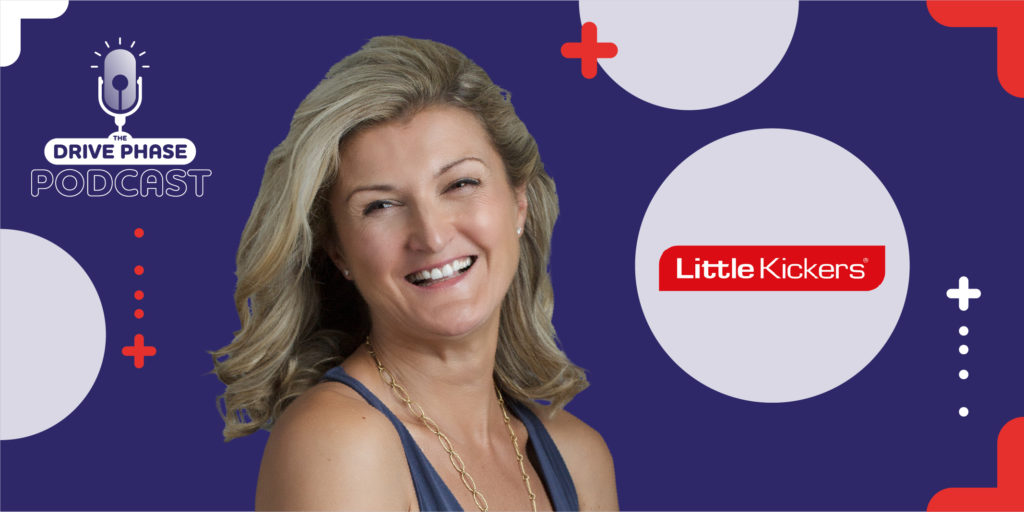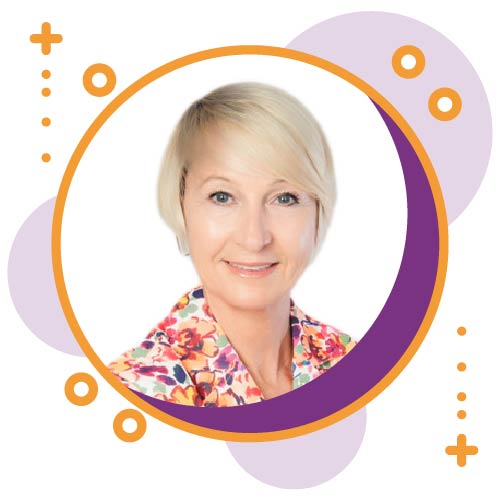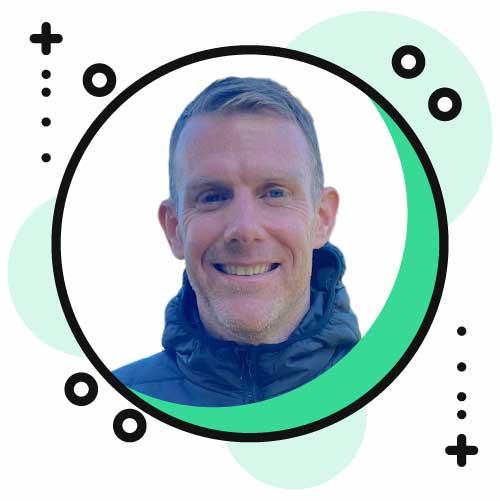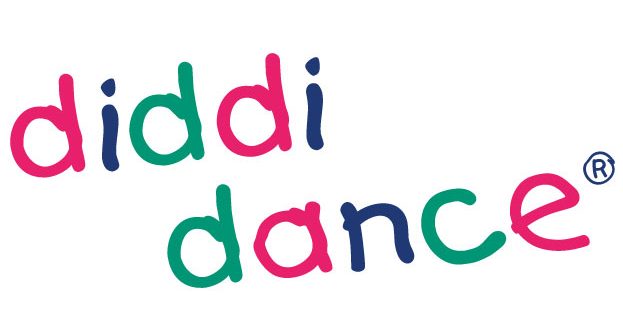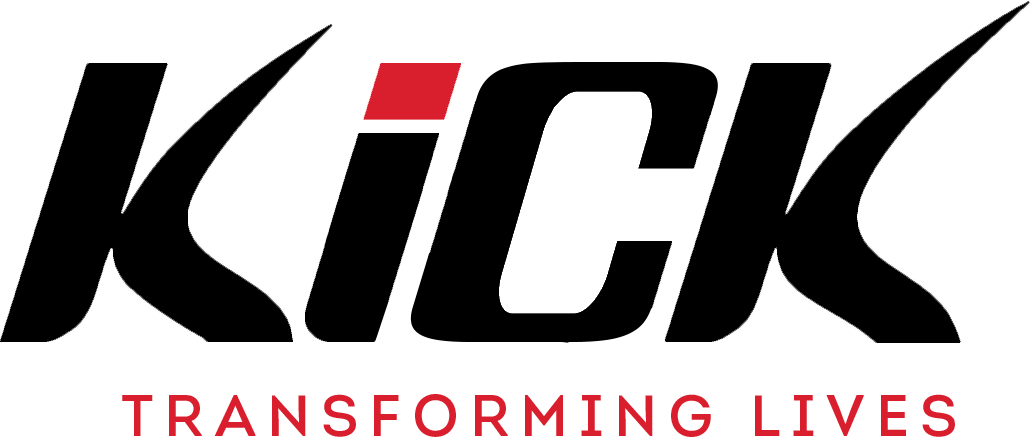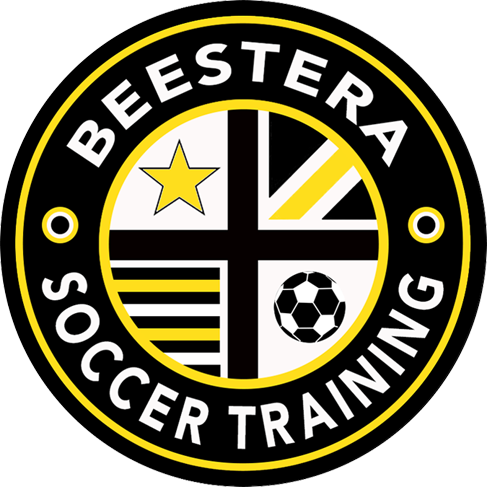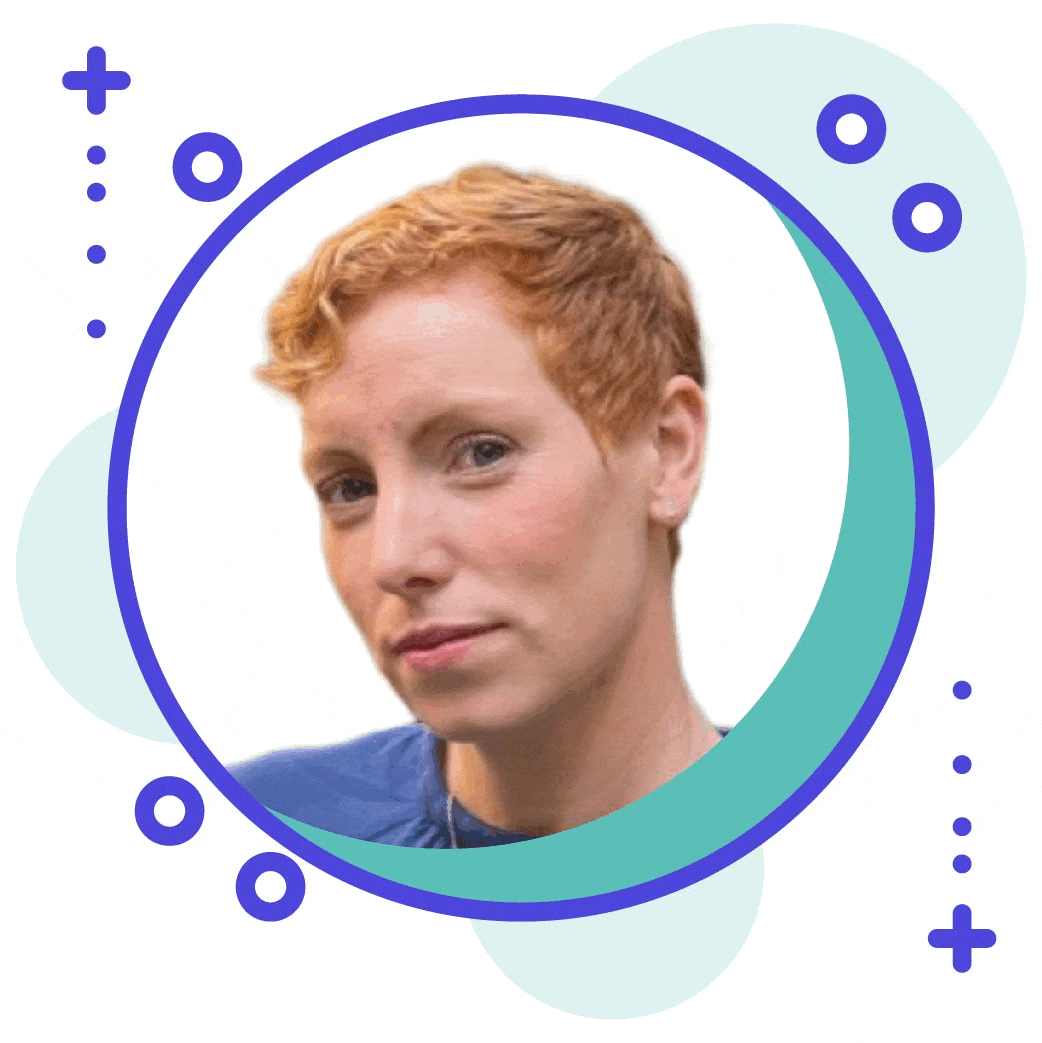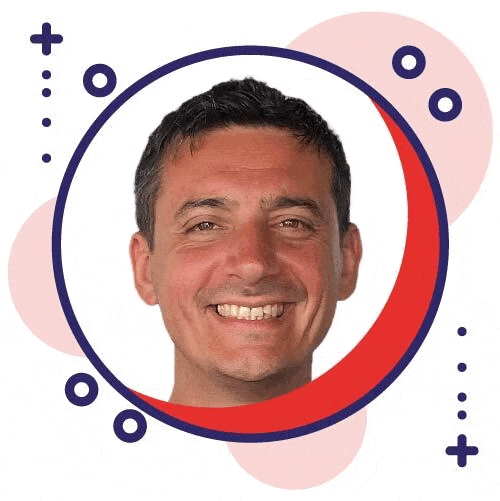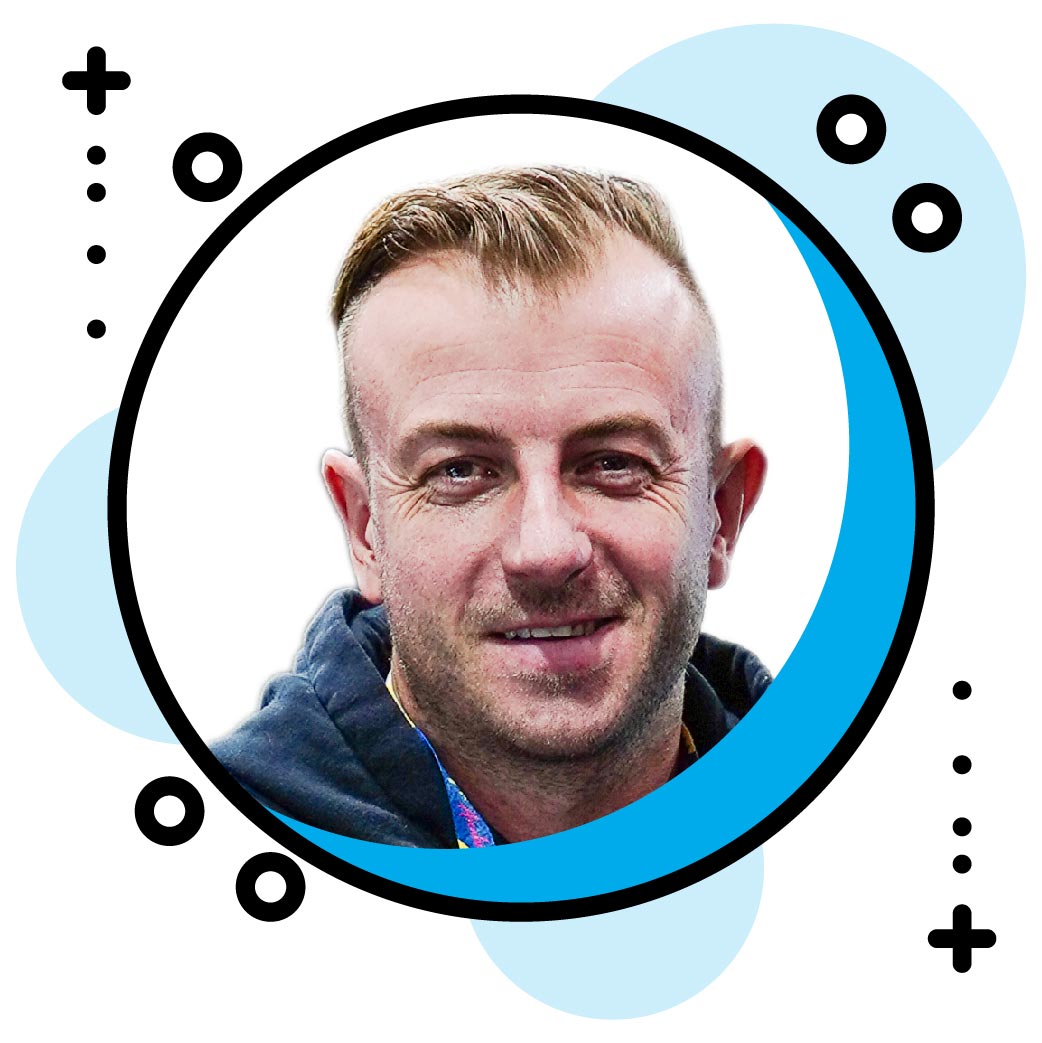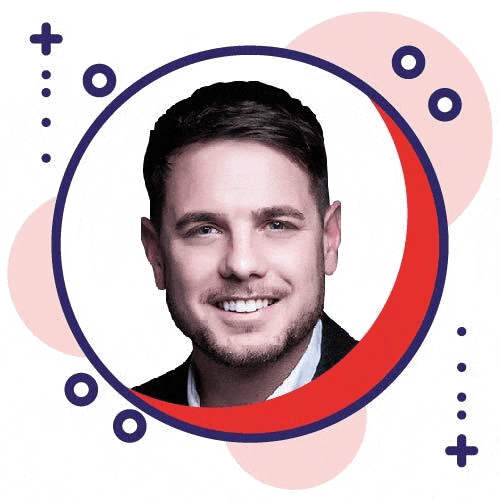Christine Kelly 0:00
Don’t give away equity unless you absolutely have to.
James Moore 0:07
From Coordinate Sport, it’s the Drive Phase, a show about sports founders, leaders and experts, and the stories behind their business journeys. Our guest on this week’s episode is Christine Kelly, founder of multi-award winning global franchise Little Kickers group. Christine and her inspirational business journey show us just what is possible in the pursuit of success and the elusive work-life balance. In this episode, Christine guides us through her transition from a successful corporate career, to seeing a gap in the market and experiencing explosive growth, to then launching and scaling Little Kickers into the global brand that it is today. With franchisees in six continents, we dive into the legal challenges of scaling across the world, and what tactics and systems she uses to stay at her best to effectively lead the company. Such a compelling interview and story with some valuable takeaways we can all learn from. So sit back and enjoy.
I’m delighted to have one of, if not the most, successful sports franchisers with us today. Some of our guests might dispute that, but the stats back it up, with 350 franchisees in six continents, delivering to 70,000 children a week. Christine, welcome to the Drive Phase podcast.
Christine Kelly 1:31
Thank you very much, James, what an intro!
James Moore 1:48
Yeah, we’ll see who disputes that with us. I’m glad we managed to navigate the time differences, and I think you’re our first guest internationally. Where I tend to start on the podcast is the backstory. So I’ve got down that you were born in Colwyn Bay in Wales, but I think you were not born and raised, just born in Colwyn Bay?
Christine Kelly 2:00
Yeah. To be honest, I don’t remember too much about Colwyn Bay. I left there when I was about a year old. But I was born in Wales and then travelled around a lot since then.
James Moore 2:12
And then you settled and went to school in York, right?
Christine Kelly 2:15
Yeah, at the time, my dad worked for Barclays Bank, and they used to make him move house pretty much every year because of his job. They have this thing where you can try and get a scholarship, and if you want one of the scholarships, they basically pay for you to go to boarding school so that you wouldn’t have to move schools every year. Luckily, I got one of the scholarships, and I ended up going to boarding school in York for seven years. So yeah, I loved York, really fond memories of the place.
James Moore 2:38
So growing up, did you have any brothers and sisters? Although with boarding, you may not have seen them as much.
Christine Kelly 2:49
Yeah, I’ve got two younger brothers. One’s four years younger, and the other one’s just one year younger. So a lot of competition between me and the one year younger brother.
James Moore 2:59
That’s always the theme of the entrepreneurs, competition growing up. So in terms of early life, were you always a business person or self-starter, entrepreneur?
Christine Kelly 3:10
I was a little bit, yeah. I constantly had little ideas and things on the go. Like I set up a little flower shop when I was about eight with some friends, and I had quite a few different ventures that I tried out before I decided to make a career of it.
James Moore 3:28
So obviously, following school, you had gone into a successful corporate career. Not in the sports industry initially, though?
Christine Kelly 3:39
When I left university, I initially joined PricewaterhouseCoopers, and I started the training to be an accountant. I was absolutely useless at it, and I completely hated it. I’d cry every Sunday night because I didn’t want to go to work the next day. It was very pathetic. But I decided that after about a year and a half, that wasn’t for me. I was living in London at the time, so I just had a look at what other kind of jobs it might be a segue into. I ended up going on to JPMorgan and joining their graduate scheme, which I much prefered. I got to do lots of travelling, it was a really interesting job, and I met some great people. It was a bit of a change, though, from accounting.
James Moore 4:18
Long hours, high pressure in that kind of corporate life?
Christine Kelly 4:22
Yeah, it was. It was a lot of travelling. I was mainly based in London, and I worked in their wall street office for a year. But it was just nonstop travelling around, visiting different countries, and meeting lots of really interesting people. It was a fascinating job because there was so much to learn, but it got to the point when I had my first child, and I was struggling a little bit with the whole work-life balance thing. It was all feeling a little bit difficult to be as performing at the level I wanted to at work, but also being a really good mum. So that tension started to show, as I think it does in lots of people at that stage of their life.
James Moore 5:01
Yeah, and then obviously that requirement for the work-life balance hasn’t really left. I know myself, and probably everyone in the world as well has struggled with that. Especially during the lockdown period we’ve just had. I don’t know if it’s probably affected you as much not having young children, but how was lockdown for you?
Christine Kelly 5:18
Well, it wasn’t fun. But what was quite nice is my kids are older now, my son turned 20 in July, and my daughter is going to be 18 next month. So they were both at home with me for a lot of lockdown. And normally, my son is away at uni, and my daughter actually went off to university in August, so I was dreading her going. But I had a nice few months where they were both at home with me. When lockdown first got announced, we had the whole debate at Little Kickers around what our strategy would be, and we decided that one of the things we were going to do is produce videos so that kids could do classes from home. But it was tricky obviously in the lockdown situation, as you can’t go to a studio and get the best people to help film. So we decided to do the videos in the garden, and I actually spent a lot of time in the back garden with my kids. My son was doing the coaching virtual classes, my daughter was filming, and I was dressed as the mascot, Lenny the lion. Rolling around on the floor and things like that, it was really good fun. But I quite enjoyed lockdown, because I got to see more of my kids than I normally would.
James Moore 6:22
Yeah, I think that’s the sentiment for all of us, being able to spend a bit more family time than we normally would get.
Christine Kelly 6:29
How old are your kids?
James Moore 6:31
I’ve got a one-year-old and a four-year-old. So yeah, definitely a handful, but I wouldn’t see them much usually anyway, so having the lockdown period was good for me. Also not much homeschooling for me at that age, so I got away with that. Some of my friends have it a bit more difficult than me. Talking about kids, from what I know, Little Kickers was born from you looking for something for your son to do at that time, trying to find something to keep him active?
Christine Kelly 7:03
What it was, I was really struggling with the work-life balance in my professional career. So I decided to take a little bit of time out and spend some time with Lucas, who was two at the time. I’d hardly seen him in the run-up to that point. It was awful. I’d see him at weekends, but during the week, I’d leave when he was still in bed, and I’d get home when he’d already gone to bed. So I took a few months off, well it was meant to be a few months off, and every day he just wanted to go down to Wandsworth Common in London and play football. I always had to be in goal because he didn’t like being the goalie. He had to be the scorer all the time. It was quite a revelation to me how much he liked football, so I decided I’d try and find classes for him because I didn’t feel particularly well qualified to teach in football. When I was growing up in Yorkshire back in the 80s, football wasn’t a sport that women got involved in, so I didn’t know where to start with it. I looked around for some classes, and I couldn’t find anything for him. In fact, I couldn’t find any organized sports classes for kids under the age of five, so I decided to set some up myself. I came across a really nice guy in a play park with his little son, and he was playing football with him. It turned out that the guy was FA qualified, so he knew what he was doing when it came to the coaching side of things. So I said to him, how about we set up a little pilot in my son’s nursery and just see if people are interested in something like this? So yeah, that’s how it all got kicked off.
James Moore 8:33
So I guess from the start, you’ve always been focused on the business side of things. Did it grow as a partnership from there, or did you take it on after that?
Christine Kelly 8:47
No, it wasn’t really a partnership. I employed him to coach for a couple of hours as I wasn’t sure if it would work. And as it was, it was quite high-level stuff. We were trying to get the two-year-olds to do grid work and things like that, which was a bit advanced for them.
James Moore 9:01
Went straight over their heads?
Christine Kelly 9:02
Exactly, but I could see that there was a demand for what we were doing. It actually got oversubscribed by about 400% that pilot. Obviously, I took all the contact details of the parents and afterwards, I said if I tailor this and make it a little bit more toddler friendly, would you be interested in signing your child up for a 12-week course? So many of them were interested. It was fantastic. We ended up at that point realising that we needed to inject a bit more child-friendliness into it, so we got a nursery school teacher to be the assistant coach, and she introduced all the Early Learning concepts: Colors, numbers, socialisation, parts of the body, gross motor skills, so it wasn’t just a pure football program at that point.
James Moore 9:46
Great, so this was 2000 to 2003, was it?
Christine Kelly 9:50
Yeah, it was in 2003 that the business really started to gain a bit of traction. And at that point, I decided to not go back to banking but to carry on doing the Little Kickers. I set up about 35 classes a week across London that year. So by that point, I had realized that obviously, people quite liked the concept and what we were doing.
James Moore 10:15
You said that like it was a simple thing, I just set up 35 classes across London. I’m trying to imagine, 2003, you’ve got this explosive growth, 400% oversubscribed, all these different sessions. I’m picturing you running around, scrambling to try and find venues or looking for staff. Was that how it was at the time? Or how did it feel during that period when it was growing so quickly?
Christine Kelly 10:40
It was exactly like that. I think it cost me about £300 to register the domains and do all the basic stuff I needed to set the business up, and then it kind of self-funded from there. I didn’t have too much money at the time to throw into the business, so I did everything myself really. Or I had two business partners at that point, actually. But we would go out and hand out flyers, chat to parents to try and persuade them to come to our classes, go and find venues, get coaches and train them up. So it was very busy and hands-on, and towards the end of that first year, there was still masses of demand for what we were doing in different areas of London and even around the UK. But I’d got to the point where I was working flat out on it, and I was almost back to where I was in banking. I wasn’t seeing much of Lucas, so it wasn’t a great solution at that point.
James Moore 11:33
I was going to say, so you were looking for that life balance, and then you started a global franchise business. Maybe not quite what you were looking for. You said you had the two business partners, was there any conflict as you were trying to grow? I know a lot of our listeners might have partners with them or fellow directors. Everyone looks at strategy and maybe have different ideas of what direction to take the business. Did that ever come up at the time?
Christine Kelly 11:58
Yeah, that’s a really interesting question. The partners both had young kids as well. After about a month, one of the partners, Mel, decided that she was struggling with the work-life balance with Little Kickers, and she didn’t have the time to spend on it. So she was bought out at a pretty early stage. Then with the other business partner, we were running it together until probably around 2008-2009, at which point we had a bit of a divergence in terms of the direction we wanted to take the business. She was very into technology, whereas I was more into the actual practical program and the franchising side of things. So I bought her out around 2010-2011, something like that.
James Moore 12:53
Just thinking back, when you were more hands-on rather than at the strategic level, what were the main recurring challenges? I think most of our listeners might resonate with you with what they’re going through at the moment.
Christine Kelly 13:10
I think for most businesses, the biggest challenge is the people. So it’s getting the right people in place, people you can trust and who will do a good job. It was a constant theme on the school run with my kids that because it coincided with classes starting in other parts of the UK, I’d get rung up by one of the coaches to say the other coach hasn’t shown up. So I’d have to pull the car over, try and keep the kids quiet, and ring all the parents on the list for that class to tell them that the class was cancelled. It was juggling the logistics around managing people that was very tricky. I think also the financial side of it was a big challenge, even though I was from an accounting and banking background. That was hard because I didn’t want to go and take out debt, and it was a very finely tuned operation to keep growing on this shoestring budget that we had. As a business, it made us have quite a frugal way of doing things which over time has really benefited us. It’s meant that we’ve been able to expand quite quickly because we haven’t spent vast amounts of money on things that aren’t strictly necessary for the business.
James Moore 14:29
I think that touches on one of my questions I was going to ask later, touching on the franchising, but did you not have to raise any external investment? Or was that down the line when you looked to grow globally? Was there any point where you’ve taken anything on board?
Christine Kelly 14:43
I’ve had to remortgage my house a couple of times, but no, it’s all been self-funded. For the most part, the business has pretty much funded its own growth, which has been fantastic.
James Moore 14:53
Yeah, brilliant. In terms of growth through franchising, talking before we started the recording was just around some of our previous guests and that kind of dilemma whether to go with franchising or whether not to. Obviously, you’ve been so successful, and I’m interested to hear your thoughts on that, and I know our listeners would be as well.
Christine Kelly 15:13
Yeah, that’s a really good question. Because the point where it got to in 2003 where I had these 35 classes a week up and running, I just thought if I carry on as I am now, I’m going to be pretty run ragged, running this business and managing the people and everything else. Or, I can look at other business models to grow. I wasn’t familiar with franchising at that point. I’d obviously heard of McDonald’s, and I knew that was a franchise, but it wasn’t a big thing in the UK back in the early 2000s. But I stumbled across it as a model and just thought this would satisfy all of the requirements that I have around making sure that the quality of what we do is maintained as we grow. Which is a critical thing for a business like ours, and it also took a lot of the strain out of the staffing decisions. Because if you have a bunch of franchisees, and they all manage their own small teams, it’s a lot easier than having me managing a team of 50 people myself. So logically, it made sense from that perspective. The other thing that I realised I liked about franchising is that it gives people the opportunity to set up and run their own business, but with relatively low risk. Because everything has been done for them, the concepts have been proven. They know that if they follow the instructions the franchisor gives them, and the template that they’re given, that the business should succeed. And I realised that I wasn’t alone in my struggle with work-life balance. I thought there must be a gap in the market for other people like me, who’ve gone back to work after they’ve had kids but don’t like the fact that they don’t get to see their kids grow up. So I thought it struck a chord with allowing parents to spend more time with their kids, but also to have their own business that could potentially grow into something big. Something financially meaningful for them that could really make a difference to the family. It turned out that roughly our first five franchisees were all ex-career women, in very similar situations to myself. They had kids and wanted to carry on working, but didn’t want to sacrifice seeing their kids grow up. So that actually worked out really well. We’re now about 50/50 men and women with our franchisees, so it works for both in terms of the work-life balance.
James Moore 17:39
You touched on quality there, and I think that’s a fear many people have if they’re thinking about going down the franchising route. Are you able to expand on that a little bit in terms of how you deal with quality within Little Kickers and your strategy?
Christine Kelly 17:53
There’s a couple of ways that we do it. The first thing is that we’re really particular about our upfront training. So when a franchisee joins us, they do a three-day training program on the desk-based side of running the business, and then they do a couple of days practical. But for the desk-based side of running the business, over the years, we have tried to make that as comprehensive as we possibly can. So there’s an enormous manual that goes with it, but the idea is that if you train the franchisees really well upfront, then less time needs to go into supporting them further down the line. Then the support process can be a bit more pleasant. Without needing to go through operational stuff every time, you can actually have a relationship with your franchisees. And I think it’s critical to make sure that training is high quality for the franchisees. The other thing we do is session assessments. So we have a couple of people in the UK who are employed by the head office to go round and check in on sessions.
James Moore 18:56
Secret shopper kind of thing, is that?
Christine Kelly 18:57
Sometimes we do it secretly, but generally, we let the franchisees know we’re coming in. The idea behind it is not that we can get angry with them if they’re not doing everything right. It’s much more that we can help train up their coaches and give them feedback. So they know what they could do to improve what they’re doing. We also try to take away any of the stress points from the franchisees of running the business. So with regards to coaching, one of the challenges is to make sure that the coaches are really well trained, and they know exactly what they should be doing every week in the program. So we’re constantly releasing videos, and we have a lot of resources for coaches. We view it as our responsibility, as well as the franchisees’ responsibility, to make sure that the quality of what we do is as good as it possibly can be.
James Moore 19:11
I’m just curious. Obviously, you work with that early year’s age group, but have you ever been tempted to expand into delivering sessions to older kids? As you see your customer base leaving every three or four years.
Christine Kelly 20:06
That’s a really good question because obviously, there’s always the temptation to grow a business when you’ve got one started, and it’s going well. I think I’ve been sidetracked a few times too many by other opportunities like that. We’ve been asked a bunch of times to set programs up for the older kids. The issue I have with it is that we have good relationships with a lot of clubs, and most of the clubs don’t start till the kids are at least five. So we don’t really compete with them. We go up to the age of seven, so it means that typically there’s quite a nice path. Our franchisees will usually get to know the local clubs, and get to know where the kids can go once they finish Little Kickers, so we’re not competing. That’s one way that I look at it. We don’t really want to get into that age group. The other thing is I actually sent an email out to all of our franchisees years ago, when we were getting pressured to expand to include older kids, and the franchisees, in general, voted not to go into that. They all like the fact that we have this niche, and we could be regarded as experts in this niche. And I certainly think it would probably have diluted what we do if we’d gone too far down that route. Some of our franchisees run classes for older kids themselves, and I’ve no issue with that, but I think for us, we’re very focused on this particular niche 18 months to 7th birthday.
James Moore 21:23
Yeah, and obviously, that’s worked out really well for you. In terms of the industry, I’ve got a question on that. Looking back to when you first started, there was a lack of providers out there. What does the landscape look like now? Compared to then, I’m assuming it’s a lot busier, a lot more competition?
Christine Kelly 21:42
There is, but it depends a little bit on the country that you’re looking at. What we’re seeing is in our more developed markets, the UK, Canada, Australia, that a few competitors have popped up, which is great. It’s a huge market, so there’s plenty of room for everybody, I think. But they tend to be more local and less organised in structure as we are, for want of a better phrase. For countries like China and India, it’s a relatively new concept to get your kids involved in sport at such a young age, and not necessarily something that parents up till now has prioritised. In those markets, we’re still pretty much one of the only operators, which is a double-edged sword really. You’ve got no real competition, but at the same time, we’ve had a massive challenge educating the marketplace. That actually, kids of the age seven and under can learn, they can play sport, and it’s important to get them to do sport. And so with those markets, we’ve had to do things like introducing a badge scheme, where every three months the children of different age groups all work towards a particular badge. And these badges are awarded for the acquisition of particular skills. That means all the kids are working towards these skills, and we can show the parents a map from when their child starts at 18 months to their 7th birthday of every skill they will acquire, or the main ones throughout their Little Kickers career. So that was important for those markets because we found that parents didn’t think it was worthwhile to just send the kids along to do a bit of sport. They had to see the educational value of what we’re doing. So I think it’s a long-winded answer to your question, but different markets are at different stages of competition. We just have to make sure that we respond appropriately.
James Moore 23:34
Yeah, I think it’s always important to evidence that progression for them, especially in those markets where it is particularly valued. Just another quick personal question, I know you touched on loads of regions there. In which region would you say you had the fastest growth? Obviously, you’re well established in English speaking markets, but what would you say is your fastest-growing market or the one you really want to move into?
Christine Kelly 23:59
It’s interesting, actually. In the UK, we sold 25 franchises in the first year without advertising, so this was back in 2004. So that was, in theory, our fastest one so far. But the really surprising one has probably been Brazil.
James Moore 24:16
Yeah, I would have thought they had football sorted over there.
Christine Kelly 24:19
Yeah, you would think so. And actually, I’m sure they do. We had a couple, Everson and Nika, who were operations managers for us in our Sydney Northern Beaches franchise. But they were originally from Brazil, and they decided that they wanted to set Little Kickers up back in Porto Alegre in Brazil and franchise the whole country. So I was chatting to them about it, and they were like, we love the concept, and we obviously buy into it. But I can’t imagine any self-respecting Brazilian parents will be keen on sending their child to an English/Canadian football program. So what we decided was that perhaps it would make sense to introduce an English language component to what we do. So we got a member of the team to work with the Selter program Cambridge University have developed to teach English, and we intertwined that with our existing program. So when kids in Brazil came to our classes, they were able to learn English alongside football and early learning skills, which went crazy. In about two years, I think, they sold over 40 franchises into different cities around Brazil. So they did a phenomenal job. We’ve actually rolled that out into other countries around the world where we operate now. I think in terms of markets we want to expand into, one would have to be China. We finished our pilot there a year or so ago, but it’s been a bit challenging expanding the business over the past year. We’ve got a couple of franchises, I’ve got lots of classes running in Beijing and Shanghai, but I think it’s such an exciting market for us. The other one is probably Germany. I think there’s huge potential in the German market. We went to Frankfurt to attend a franchising fair back in November last year, and there was a lot of excitement around what we’re doing. But I think mid-COVID lockdown wasn’t the best time to launch franchising into Germany. That’s the one that I’ve got my fingers crossed it’ll work out for us once the pandemic is over.
James Moore 26:22
I’d say it’s always a challenge. Obviously, when we’re talking, it sounds like it’s a seamless upwards trajectory, and we can have that growth curve, but I’m assuming there’s ups and downs along the way. What would you say your biggest setback has been on your journey so far?
Christine Kelly 26:44
I think the thing that has caused us the biggest challenge is probably legal requirements. Every country has different requirements for franchising, and we have a standard franchise agreement that forms the basis of all of our agreements. But for every country we go into, we have to speak to their local council and get them to review and customise the agreement, in case there are any disclosure requirements we have to make in that particular country. So it’s quite a legal challenge to get this up and running in those countries. Then you have to register all the trademarks and everything else, which can take around eight years in some countries. So that’s probably been the thing I would say that slowed us down the most. If we look at South Korea, for example, we’ve had lots of people who wanted to buy the rights for South Korea. But when you look at the costs, it would cost about $120,000 to get the legal work done in that country. So it’s quite off-putting for people to enter into this agreement if they’re having to cover those kinds of costs. So I think that’s probably the biggest hurdle to the business growing, the legal requirements for different countries around the world for franchising.
James Moore 28:02
I don’t know if this was a challenge or not, obviously back in 2009-2010, you moved from London to Toronto. Nowadays, it’d be easy to communicate with people all over the world, but back in 2009, how was that and what was your experience with growing?
Christine Kelly 28:23
Yeah, it’s a good question. At the time I probably had about 75 franchisees in the UK. We had just gone into South Africa, Australia, New Zealand, and were negotiating Hong Kong at the time. I didn’t necessarily want all of the franchisees to be upset that I’d made the decision to move, but I really wanted to move. So I thought the best thing would be if I made the move to Canada, and then I’d get up at like six in the morning to have conference calls with franchisees in the UK. Then after I’d been there for two months I just sent out an email just saying, by the way, I’ve moved to Canada. A few people were a bit like, oh, no, what are we going to do? And I said well actually, I’ve been living here for the last two months anyway, and no one’s even noticed. So thanks to Skype, it’s made things a bit easier. I think as well as a company we’ve had maybe two different offices over the years, but really most of our team have always preferred to work from home. A lot of us have kids and don’t want to do the commuting time or anything like that. All of our franchisees work from home, so before that point, there weren’t many occasions where all the franchisees would meet up face to face. We have a conference once a year and we sometimes do forums in person, but I can always fly back for those kinds of things. So the move overseas wasn’t as dramatic as you might suspect. It also meant, more importantly for the business, was that instead of being viewed as being a UK based company that expanded overseas, we had become more of an international company. We had a small team in Canada and a small team in the UK. But we were able to support people for an extra five hours every day. So it meant it was much easier to support all these different countries around the world because the head office teams had a five-hour extra window that we wouldn’t have had if we were all UK based.
James Moore 30:25
Yeah, definitely. So you’ve basically been preparing for this period of time setting up all the remote teams all those years, so it hasn’t really affected you too much in terms of sending everyone to work from home?
Christine Kelly 30:35
No, everyone works from home anyway. For me, it’s been a bit annoying, because suddenly my house has loads of people in it with the kids working from home. The house is really noisy, whereas normally pre-pandemic it was really quiet.
James Moore 30:47
So would you classify Little Kickers as a Canadian company or a British company now? Obviously, it’s gone global, but what would you call your head office?
Christine Kelly 30:58
It’s a mixture, I would say. There are more people from our head office team in the UK. There are only a couple of us based in Canada now, Though it did go through a phase when I first moved here where we hired more people in Canada. I think in 2013, I took on Canadian citizenship, but now I’m a joint British Canadian. My kids going off to university this year has meant that actually, I’m now free to spend time a bit more where I want to. So I have been in Canada every summer when the kids come home. But to be honest, I don’t know if you’ve ever been to Canada in the winter, but I’m going to be out of here back in the UK. So I think as a company we’re a real mixture of British and Canadian.
James Moore 31:43
When you started franchising, did you have the grand vision of the global franchise, or was it organic, and it just grew like that because of the demand?
Christine Kelly 31:57
If I didn’t think it had the potential to turn into a really big business, I probably wouldn’t have been that interested in doing it. I probably would have just moved on and done something different. Because I always wanted to have something that leaves a bit of a mark, and that’s a bit meaningful. But I’d be a complete liar if I said back in 2002 that I knew the business was going to grow to the extent that it has. I think it’s just really happened organically. Even looking at the international growth, it was people contacting us asking if they could buy franchises overseas that made us get into that. So I think I wanted to have something big and meaningful, but I think the opportunities have presented themselves, and I’ve quite happily taken those opportunities if they’ve made sense for the business.
James Moore 32:50
Yeah, definitely, and multi-award-winning as well, along with the growth you’ve had. I know this year you received your biggest award to date, the global franchise of the year 2020. It must mean a lot to you to reach those heights.
Christine Kelly 33:10
Yeah, it was amazing. We didn’t think we’d be in with a chance to win it to be honest, but I got notified in advance that we might be in with a chance. So we decided to take the whole team to Orlando for the award ceremony.
James Moore 33:25
That was going to be one of my questions. I didn’t know whether you’d missed out on a party or not if it was during lockdown that it was announced.
Christine Kelly 33:31
It was just before lockdown, the end of February, so we were all a bit nervous about flying. But we were like, well, Orlando’s Orlando, let’s give it a go. We all flew over there and had four days doing Disneyland and all that kind of stuff. It was great fun, just a big team bonding session, which was fantastic. We’d managed to keep it secret from the team, even though it had accidentally been announced in advance on our social media. I discovered that 7 am on the day of the awards, but I managed to get that removed before anyone saw it, and luckily the team didn’t know, so it was a real surprise on the night. We were absolutely thrilled. Looking at the companies that we were up against, it was a real surprise, but also an amazing honour.
James Moore 33:45
All of the achievements you’ve had over the years, have you developed any philosophies or theories, and ways of doing things that you stick to? And are they yours, or are you taking them on from elsewhere?
Christine Kelly 34:31
I think as a company there are a few things that we’ve done. So one of the things that we recognised early on was that so many of the great ideas that drive our business forward and make us a bit innovative and different come from our franchisees. Because the franchisees are dealing with customers every day, and they’re seeing what the competitors are doing in the market. They’re seeing what people want in the market, the way it’s evolving. So we’ve made a massive effort to have that two-way communication with the franchisees to get intel from them as to how they think we should be developing the business. What can we do to make their lives easier? So in terms of operational processes and such, I guess one of the things is communication. Leading on from that, back in 2013, we adopted this methodology called EOS, which is the Entrepreneurial Operating System. It’s a framework that you can use as a business which means that you communicate better and be more organised. With it, everyone on your team knows exactly what the overall objectives of the business are, and what you need to be doing to achieve those objectives. And that’s been phenomenal for just keeping us very much focused and on track. Going back to when you were asking about different age groups, we also quite often get approached by organisations wanting us to do other sports. EOS taught us that you need to find and stick to your niche, and become really good at that one thing and grow it as wide as you can. So we have EOS to credit for that, too. But that system has been absolutely brilliant for our business. I think that’s probably about it in terms of business systems and processes. On a personal level, I found it really useful over the last ten years since I moved to Canada. I’ve been involved in some business forums, so I meet up with other entrepreneurs every month, and we talk about the challenges we’re facing with our businesses. What we want to do next, and how we want to grow. But that’s fantastic because it can be lonely, I think, running your own business. Because, as you all know, a lot of the time you are just pushing it forward, pushing it forward. But you don’t have that many people who say, oh well done, or check in with you on how you’re getting on, and I think it’s brilliant to have that mentor network that you can use as a sounding board. And just for a bit of moral support sometimes.
James Moore 37:03
Yeah, 100%. And that’s the idea of the podcast as well, to add a bit of value to other business leaders out there. The last question on the business side of things I’ve got is what does the future hold for Little Kickers? I know this year has probably scaled back many people’s strategic objectives, but I know you’ve got to plan what you’re looking to do moving forward.
Christine Kelly 37:25
Yeah, it’s been a really interesting year for us. If someone had told me two years ago that this was going to happen, and our business is going to be locked down for three months minimum, in all the different places we operate around the world, I would have just panicked. But what’s been interesting about it is that just before lockdown we made the move to a monthly recurring model. So instead of customers signing up and paying for 12 weeks in advance, we now take monthly payments. Then they can tell us when they want to stop coming so we can stop the payments then. We didn’t realise quite how impactful it was going to be on the business and quite how important it was going to be when lockdown happened. It meant that when the lockdowns started, we were able to contact our customers and say, look, you usually pay us every month. How about we put your membership on hold, and any classes that we owe you from this month we can deliver when we open again. So we’ll put everything on hold while we’re locked down, and then when the government says it’s safe to start again, we will. That enabled us to retain the bulk of our customers across the network during lockdown. It also enabled us not to have to refund our customers. There’s a couple of big US companies that do what we do, and they were in a position where it was a lot more seasonal. They were just coming up to this summer season, and they had just taken in like 12 weeks of money from a lot of their customers when the lockdowns started. So the customers all said, well, the summer season is obviously off this year, we want our money back. We’re also looking more at social responsibility. It was supposed to be kicked off in June this year, but unfortunately, because of the pandemic, we couldn’t. Every child who starts our classes gets a free uniform, and at the moment, all of our uniforms are made out of 100% polyester, and they’re packaged in single-use plastic bags, which is obviously really bad for the environment. So we had a franchisee conference at Old Trafford last October, and the franchisees said this is the big thing we want you to change. We want this to be environmentally friendly. So we found a supplier, and basically, they take plastic bottles out of the ocean, and they can turn the bottles into fabric and make football strips out of them. It’s crazy because I got sent samples as I was sceptical whether they would feel like plastic bottles, but they’re amazing. They feel just like the other uniforms. So we’re meant to be moving to that in June of this year just gone. But obviously, there’s a slight increase in price for that, and we didn’t want to increase any prices at all during the pandemic with all the uncertainty. We don’t want to pass any of that onto our customers. But the idea is as soon as the pandemic is over, we’re going to be moving to those. Then once children have finished with those uniforms, they will be able to hand them back to the local franchisee, and they’ll get a little wristband or something to thank them. The uniforms will be recycled, and we’ll get volunteer coaches from the Little Kickers network to take them down to one of six orphanages in South Africa. They’ll deliver the uniforms together with balls, goals, and all the other kit and equipment that’s needed. Then the coaches will train up local people on the ground as to how to run our programs. So that’s the big eco initiative that we’re trying to kick off at the moment, and we’re keen to find a corporate partnership that we can enter into because it’s a pretty big project for us to do on our own. We’ve actually been doing a similar thing in Malawi for the last few years, but not with recycled uniforms. We’ve been sending coaches to a preschool down there for the last three years or so. So we know that we have people interested in doing it, and we know it works. It’s just actually getting together the funds to move to this particular model. So that’s one of the other big things that we’re planning on focusing on in the future.
James Moore 41:31
Yeah, so getting those multiple impacts. You’ve got that impact on the children with the programs, and then with the CSR doing that for the wider community, I love that. To finish off, I usually ask a couple more personal questions. So, do you have a daily routine that you go through? Things that you focus on for improving your performance in business, and any habits you’ve developed over the years?
Christine Kelly 41:55
I think it’s probably the opposite of most people’s daily business routines, as I try and make sure I always have time to go and walk the dog. I live about five houses up from the beach in Toronto, so I’m out there every morning and afternoon with my dog. But it’s just giving myself time to decompress. To think about things rather than just rushing from one thing to the next. When I think back to the beginning, the first 10 to 15 years of Little Kickers, I was running around like crazy just trying to keep all these balls in the air. About three years ago, we hired a CEO, Alan Kennedy, who’s been fantastic. He takes so much of the stress of the day to day running the business away from me, and I don’t know if I could have sustained the work level I had for much longer. So for me, one of the main things is just making sure I have that time for myself. I think you probably have some of the best ideas when your mind’s not focusing on working all the time, but when you free up, and you’re out in nature and things like that.
James Moore 43:00
Yeah definitely, gives you some time to get some perspective as well. My last one, I think you’ve maybe touched on it already, but if you could go back to when you started the business and speak to yourself, what would you tell yourself, your one message?
Christine Kelly 43:19
I think it would be don’t give away equity unless you absolutely have to. So I’ve had a couple of instances over the years where I’ve had to remortgage my house. It’s been buying back equity in the business. The crazy thing is, when you chat to your team about equity, most people aren’t that interested in it anyway. They’d rather get a bigger bonus or something like that. So people don’t really value equity, but then when you need to buy it back, it can be really challenging. Particularly if you’ve slogged away at growing the business and really increased the value of the business. Don’t give away your business too lightly. When you start it, and it’s not really worth anything, it’s easy to say, oh well, I’ll just give this person 30% of this. But actually, you don’t know what it’s going to grow into, and why are you starting a business unless you think it’s going to turn into something fantastic. Yeah, I think that would probably be the message I’d give to my earlier self, that actually this is going to work, and don’t give away all your equity.
James Moore 44:28
Brilliant, I love that. Thanks so much for your time today, giving up an hour or so to speak to us. We’re going to have the show notes written up, so any of the things you’ve mentioned, especially the EOS system, we’ll try and link that into the notes in case anyone’s interested in getting hold of that. And if anyone does want to get in touch with you, I’m assuming not all the territories are gone?
Christine Kelly 44:53
Yeah, it’s just christine@littlekickers.co.uk
James Moore 45:01
Fantastic. Once again, Christine, thanks very much for your time.
Thank you for listening to this week’s show. You can subscribe anywhere you get your podcasts. If you’d like to get in touch with us, you can write to us at drivephase.podcast@coordinatecloud, tweet us @coordinatesport or follow us on Instagram @coordinate_sport or on my account @james_ventures. This episode was produced by Nancy Kwamboka, with support from Claire Goodchild, and Lola Small. And a special thanks to Rochelle. I am James Moore and you’ve been listening to the Drive Phase from Coordinate Sport.

